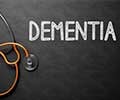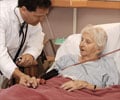Vascular Dementia - Frequently Asked Questions
Q: Which doctor should I consult for vascular dementia?
A: You should consult a neurologist or neurophysician if you suspect dementia.
Q: Does memory loss mean I have dementia?
A: No, memory loss alone is not dementia. Forgetting keys or directions occasionally does not mean you have dementia. Memory loss along with a decline in cognitive functioning may be warning signs of dementia.
Q: Who is more at risk for developing vascular dementia?
A: Anybody can develop vascular dementia. The main risk factors for vascular dementia are smoking, high blood pressure, a history of stroke, atrial fibrillation, and coronary heart disease.
Q: How can I manage my symptoms of vascular dementia?
A: People affected with vascular dementia can manage their day-to-day activities to some extent by following a routine, using memory aids, communicating needs directly to others, being themselves, and maintaining and by maintaining a healthy social life.
Q: Can dementia be cured?
A: Dementia can be reversed in some cases if the brain has not suffered too much damage. For example, if dementia is caused by vitamin B deficiency, then it can surely be reversed. Similarly, if dementia is caused by a tumor in the brain, then the symptoms may disappear by removing it.
Q: What are the five causes of dementia?
A: Dementia is caused by damage to or changes in the brain
Common causes of dementia are:
- Alzheimer's disease
- Vascular dementia
- Parkinson's disease
- Dementia with Lewy bodies
- Frontotemporal dementia
- Severe head injury
Q: What are the 7 symptoms of dementia?
A: These may include increased agitation, depressive symptoms, anxiety, wandering, aggression, or sometimes hallucinations. bladder incontinence is common in the later stages of dementia, and some people will also experience bowel incontinence. appetite and weight loss problems are both common in advanced dementia.
Q: At what age does dementia start?
A: For most people with Alzheimer's — those who have the late-onset variety — symptoms first appear in their mid-60s or later. When the disease develops before age 65, it's considered early-onset Alzheimer's, which can begin as early as a person's 30s, although this is rare.
Q: Can stress cause dementia?
A: The current evidence indicates that while chronic stress may play a role in the development or progression of dementia, it does not necessarily cause dementia. Hopefully, further research can begin to uncover what role stress plays in a person's risk of developing dementia.
Q: What is the best treatment for dementia?
A: Donepezil (also known as Aricept), rivastigmine (Exelon) and galantamine (Reminyl) are used to treat the symptoms of mild to moderate Alzheimer's disease. Donepezil is also used to treat more severe Alzheimer's disease.









